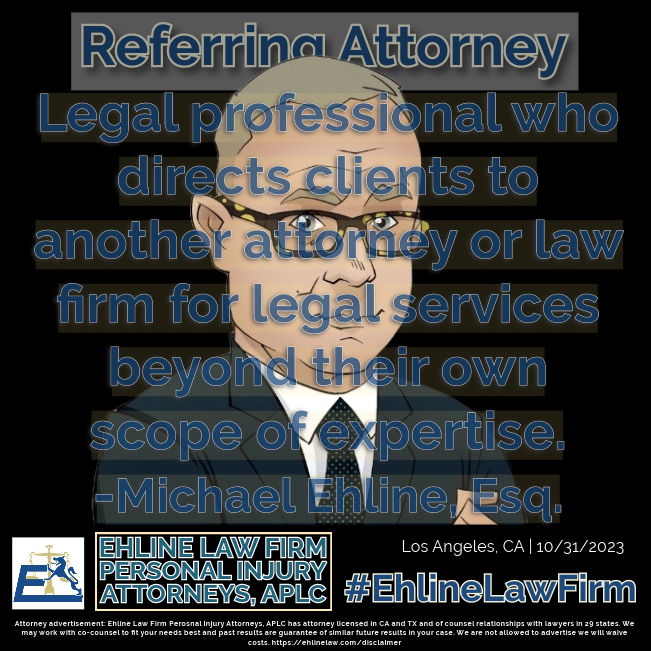
What is Difference Between Handling and Referral Attorneys?

What is Difference Between Handling and Referral Attorneys?
“Handling Attorney” and “Referral Lawyer” Defined

Knowing the difference between a referral attorney and a handling attorney is essential. And four main ways exist to tell the difference. The referral lawyer is a lawyer who remains outside your lead counsel. Generally, the litigator or trial attorney advances litigation. A referral lawyer can play various roles, from rainmaking to getting the client’s contact information. Here, the duties of litigation get passed to another lawyer.
So, if the referral attorney plays a secondary role, they might gather records. Or they help deal with client meetings to free the leading advocate to work on the case file.

Why Should You Care if the Attorney is a Referral Lawyer or a Handling Attorney?
No clear-cut answers reveal themselves if a client should have a referral counsel involved. The secondary rep can help assist. Also, they help you communicate. And they can assist in selecting a handling firm qualified to handle the type of case. They can also act as legal counsel to discuss your potential matter.
Why a client might be concerned if the attorney is a referring lawyer or a handling attorney, which includes:
- Trust and Relationships: Selecting an attorney means you want to trust their ability to handle your case. And if the attorney is a referral rather than the handling lawyer, then confidence is misplaced. So it wouldn’t be unusual never to meet the attorney managing your case.
- Divided Fees: This refers to the attorney taking a portion of any recovery in a case. Signing up with the referral attorney can mean that they will receive a part of the recovery. And the handling lawyer shares the fee. So the handling attorney will determine if your case is worth their time. And if it is a borderline damage or liability claim, they reject it. Having a referring attorney involved in your case could make the difference. The sending lawyer can convince a handling lawyer to take the chance.
- Asking Questions: Before signing up with an agent, you may have questions dealing with their performance, their case evaluation, and their credentials. Questioning how they will pursue your lawsuit is another line of common question. The handling attorney is in the position to determine how the case will get handled or litigated. Referral people usually can’t give anything but their opinion of what might happen. They usually will have no standing in the case.

The client should know whether they are dealing with a referring attorney or a handling lawyer, and four easy steps can be used to determine which expert is hired.
Four Steps to Separate the Referring Lawyer from the Handling Attorney
- Cases Referred Out: One way to determine which type of representative you are discussing your issue with is by the percentage of patients that they refer out to others. One example is a medical malpractice attorney who refers out all of his claims. Only ask them the portion of his or overall cases referred out. A wise move would be to ask what percentage of files they see similar to yours.
- Current Active Breakdown of the Attorney’s Docket: Attorneys list different cases in their advertising. And this can be very misleading. Some attorneys have a docket made of one or two kinds of situations. But they may refuse to handle every single type of case they advertise. So it gets based upon the marketplace of accidents. Sometimes, it’s nice to have several firms assisting your attorney in the case. You are ok so long as they split the fee among themselves and your price remains the same.
- Ask the attorney if they intend to refer your case out is one way to find out. Most of all, they have an ethical obligation to avoid misleading potential clients. Most lawyers are honest and would answer the question truthfully. Assuming the attorney admits they won’t refer your case, they are likely reliable.
- Get it in Writing and Read the Fine Print: In the usual attorney contract, a clause that permits them to bring in a co-counsel will be present. And they have the right to refer a case out if they decide. However clients can modify contracts. So, if you decide against the other attorney handling your case, ask to cancel the contract. Also, you should demand the lawyer forfeit the right to any fees if the patient is referred out. Also, stories abound of attorneys who claim the cost is 15% or 25%. But usually, a hook remains or possibly a bait-and-switch sales tactic. So, contact the California State Bar if you suspect an attorney is using a bait-and-switch fee.
This fee is a decision that should be yours. And never leave this up to the “suits” unless you agree. California public policy favors paying a referral fee. And this exists for many reasons. One of these bar members has inside connections into the legal fraternity. They can help you find the most qualified representative. And they will still stay involved in the case and get a fee. So, no downside exists to getting a referral.
Categories
- A to Z Personal Injury Podcast
- Car Accident
- Government Tort Blog
- Insurance Law Blog
- Piloting and Aviation Accident Blog
- Premises Liability Blog
- Products Defect Blog
- Recreation-Sports Accident Blog
- Reports
- Service Related Cancer Blog
- Sexual Assault Blog
- Spinal Cord Injury Blog
- Torts, Examples, Explanations
- Train Accidents Blog
- TV, Media & Firm News
- Uncategorized
Firm Archive
Main Los Angeles Location

Michael Ehline
Michael Ehline is an inactive U.S. Marine and world famous legal historian. Michael helped draft the Cruise Ship Safety Act and has won some of the largest motorcycle accident settlements in U.S. History. Together with his legal team, Michael and the Ehline Law Firm collect damages on behalf of clients. We pride ourselves in being available to answer your most pressing and difficult questions 24/7. We are proud sponsors of the Paul Ehline Memorial Motorcycle Ride, and a Service Disabled Veteran Operated Business. (SDVOB.) We are ready to fight.
Go here for More Verdicts and Settlements
